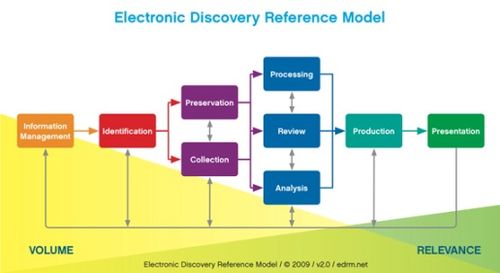eDiscovery Daily Blog
eDiscovery Trends: Your Chance to Comment on Code of Conduct for eDiscovery

The Electronic Discovery Reference Model (EDRM) has made numerous contributions to the eDiscovery industry since it was founded in 2005, with the EDRM diagram (above) having become a universally accepted standard to reflect the eDiscovery life cycle.
The latest contribution is a first draft of the EDRM Model Code of Conduct (MCoC), which focuses on the ethical duties of service providers associated with these five key principles and also provides a corollary for each principle to illustrate ethical duties of their clients:
- Professionalism: Service Providers should perform their work in a competent, accurate, timely and cost-effective manner, adhering to the highest standards of professionalism and ethical conduct. Clients should be forthright, accurate and timely in their dealings with Service Providers and act at all times in accordance with the highest professional standards of ethical conduct.
- Engagement: Service Providers should collaborate with Clients to establish and memorialize the terms of their relationship including any reasonably foreseeable parameters as early as possible upon the initiation of any new engagement. Clients should provide sufficiently detailed information about the subject matter, the parties involved in the litigation and any material issues or variables that would assist the Service Provider in accurately defining the engagement.
- Conflicts of Interest: Service Providers should employ reasonable proactive measures to identify potential conflicts of interest, as defined and discussed below. In the event that an actual or potential conflict of interest is identified, Service Providers should disclose any such conflict and take immediate steps to resolve it in accordance with the Guidelines set forth below. Clients should furnish Service Providers with sufficient information at the commencement of each engagement to enable each Service Provider to identify potential conflicts of interest. If an actual or potential conflict of interest is identified and disclosed and the Client elects to proceed with the engagement, the Client should work in good faith with the Service Provider and other parties to facilitate a resolution to any such conflict in accordance with the Guidelines set forth below.
- Sound Process: Service Providers should define, implement and audit documented sound processes that are designed to preserve legal defensibility. Clients should cooperate with Service Providers to ensure that auditable, documented sound processes, appropriate for each engagement, are defined and implemented by all concerned parties to preserve legal defensibility.
- Security and Confidentiality: Service Providers should establish and implement procedures to secure and maintain confidentiality of all Client ESI, communications and other information. Clients should work with Service Providers to ensure that reasonable measures, appropriate for each engagement, are established and implemented by all concerned parties to secure and maintain confidentiality of all ESI, communications and other information.
Each section then provides detailed guidelines and a discussion section to provide more detailed guidance and recommendations. The MCoC also provides a detailed introduction to illustrate the need for guidance in ethical decision making, as well as the scope of the guidelines.
Now is your chance to provide feedback! This initial draft of the MCoC is open to all for public comment through September 30, 2011. You may post comments at http://www.edrm.net/004 or email comments to mail@edrm.net to provide feedback to the team.
The EDRM MCoC team will review all feedback at the EDRM Mid-Year meeting, in October and will publish the first version of the MCoC will be published in January 2012, prior to the LegalTech NY conference. These guidelines are a much needed statement on the ethical duties of participants in eDiscovery activities and the efforts of the MCoC team are truly commendable!
So, what do you think? Do you believe that these guidelines are a major step in the right direction? Please share any comments you might have or if you'd like to know more about a particular topic.
